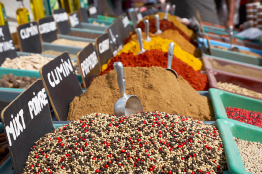Module 8
1. Module 8
1.3. Page 3
Module 8: Daily Living
Explore

© Nataliya Hora/15017382/Fotolia
In many grocery stores there is an aisle that sells bulk foods. Items such as candies, nuts, spices, baking ingredients, dried fruits, cookies, and dried cereals are in large containers from which customers serve themselves. The same items are also sold in packages elsewhere in the store. Often, but not always, the same items sold in packages are more expensive. In the bulk aisle, prices are commonly expressed per 100 g. The following example will show a method you can use to compare items sold in packages to items sold in bulk.
An example is given as an illustration of what is expected.
Example 2
Skyler can buy baking almonds from the bulk bins for $0.99/100 g. He can also purchase a 250-g package of almonds for $7.99. Which is the better buy?
Solution
View the animated “Example 2 Solution: Unit Price Solution.”
 Self-Check
Self-Check
In this question you will convert prices between pounds and kilograms.
SC 5. Kim finds jellybeans at the local supermarket. Help Kim decide which jellybeans are the better deal: those from the bulk bin, which sell for $0.49/100 g, or the 150-g package, which sells for $1.39.
 Try This
Try This
In this activity you will explore the difference in price between at least five items sold in bulk and the same five items sold in 100-g packages.
Prepare: Make a trip to your local grocery store or look on the Internet to find prices to complete a table like the one that follows. Record prices from five items in the bulk aisle. Then find the prices of equivalent prepackaged goods. Remember to record the prepackaged weights.
TT 1. Complete a table like the following. An example has been done for you. Round calculated prices to the nearest cent.
|
Item |
Bulk Price/100 g |
Package Size |
Package Price |
Package Price/100 g |
|
baking almonds |
$0.99/100 g |
250 g |
$7.99 |
$3.20/100 g |
|
a. |
|
|
|
|
|
b. |
|
|
|
|
|
c. |
|
|
|
|
|
d. |
|
|
|
|
|
e. |
|
|
|
|
TT 2. Were any packaged items cheaper than the equivalent bulk items?
TT 3. Even if more expensive, why do some consumers prefer to buy packaged items?
TT 4. Look on the Internet for cost-comparison calculators, which may assist in checking your table entries. There are a number of cost-comparison calculators available for both the computer and cellphone. Search the web for the best calculators, and be prepared to share these with other students. And, of course, you may use one of these calculators in the future to guide your own shopping!
 Share
Share
Share your answers to TT 1 to TT 4 with a partner or group. Focus your discussion on TT 2. Discuss the advantages and disadvantages of buying prepackaged items. What are the advantages of buying items in bulk, other than just the lower cost? What might some disadvantages be?
Summarize this discussion in a paragraph and save a copy in your course folder for future reference.